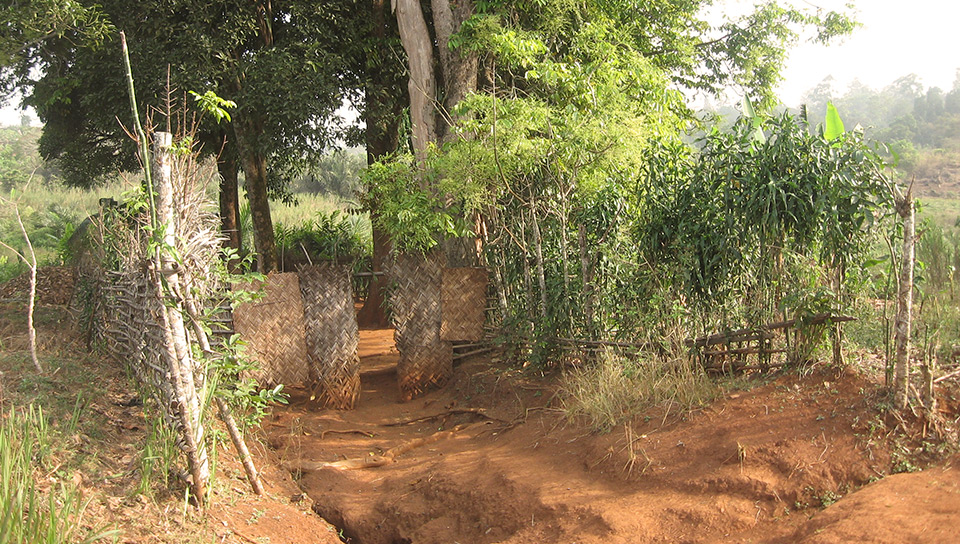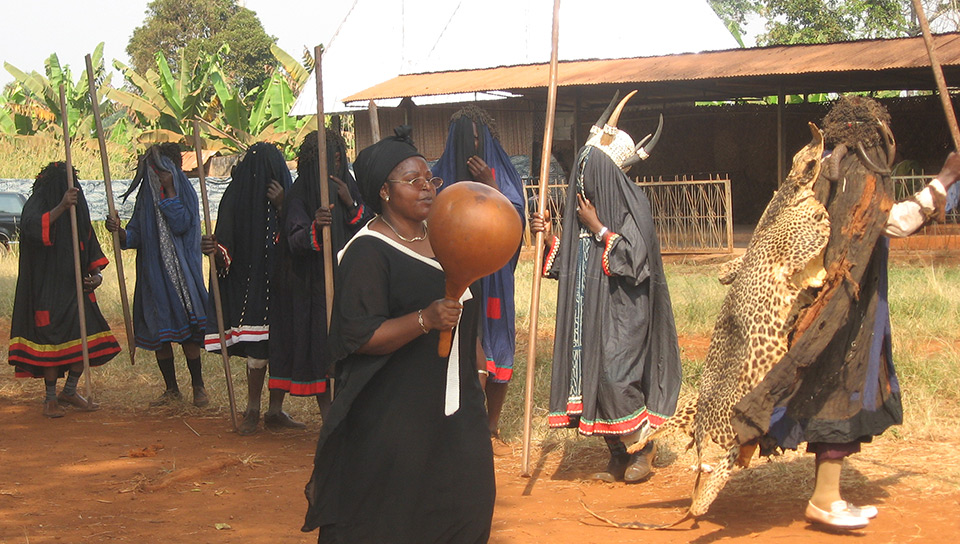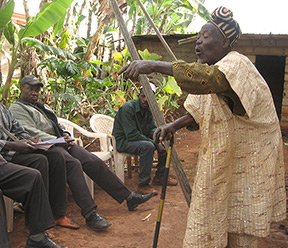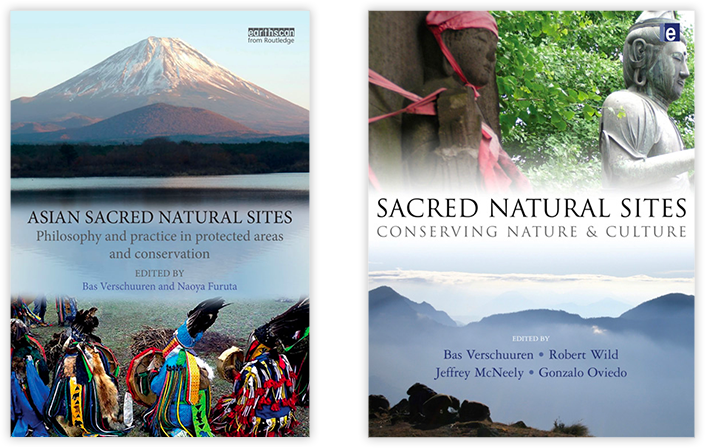Jo Bandjoun teritorijā Kamerūna Rietumos atrodas dažādās vietās uztver kā svētu, ko vietējie iedzīvotāji. They are the remnant cores of sites that were historically a lot more extensive representing the identity of tribes and communities in the region. The character of separate sites differs in terms of function and the social group that makes use of it. Two examples are family shrines, usually with presence of a fig tree (Ficus sp.), and community gathering places which constitute centres of traditional initiations to the community life. Dalīta funkcija vairumā vietām ir pielūgsme no dieviem. Pat ja šīs svētās dabas objektiem ekoloģija ir saņēmusi lielu uzmanību datumu, tie ir zināms, ka ostas dzīvniekiem un augiem, kas ir lielā mērā pazuda no apkārtējās teritorijās.
Draudi
Traditional leaders stated that the survival of sacred areas is not threatened because these areas are strongly linked with the community identity. Nevertheless they worry about the changing attitude of young people who are becoming increasingly materialistic and disobey taboos and show lest respect for ancestral beliefs. Šodien, daudzi cilvēki izmanto svētās vietas, neinformējot viņu aizbildnis, norādot eroziju kultūras normu. Vairāk galvenie draudi ir noteikti, tomēr lielākā daļa ir zem diskusijas starp vietējiem iedzīvotājiem pašiem.
Infrastructure development, especially road construction and urban settlement, has caused the degradation of sacred areas in Bandjoun. The expansion of Christianity offers alternative views on the need for protection and honesty. Some Christian priests are said to have a diabolic view on the sacred sites. According to some local traditional spiritual leaders the fact that for Christian’s punishment of wrong deeds comes after death, while for local beliefs punishment takes immediate effect increases people’s disobedience of the ancestral beliefs and taboos.
Tomēr, a decreasing influence of Christianity on local beliefs is also reported as well as an increasing willingness of Christian priests to listen to locals and work on an interfaith understanding. According to some, even modern education can have a negative impact on traditional beliefs, due to the decreasing time children spend with their parents. Papildus, the changing lifestyles cause a decreased interest in traditional values putting the continued care for these sacred natural sites at risk.
Aizbildņi
Gadsimtu gaitā, ka Bandjoun cilvēki ir izstrādājuši senču vadības sistēmu sakrālo dabas teritoriju. Dabas un daļēji dabas svētvietām atrašanās vieta tiek identificēta ar uzsākto garīgajiem līderiem (MkamSi, Guèkè). Lai gan lielākā daļa ir sen iedibināta, the location of a sacred area is not immutable and can be changed for reasons like road construction or socio-political reorientation. Parasti, katra svēts platība ir atbildīgas par līdzekļu pārvaldītāja sauc Nongtchuép. Viņš ir atbildīgs par to, upurus un upurus, par ko viņš var arī pilnvarot pārstāvi. These are initiated elders who are universal custodians. Viņiem ir tiesības strādāt visās dievkalpojumu vietās.
Even though women are generally regarded as heaving little to do with sacred areas, deeper investigation revealed that their role is present, but hidden and ignored. Piemēram, Megnesi (female equivalent of MkamSi) have the same capacities and duties as their male counterparts. Only the mothers of initiated twins can clean certain sacred sites. A woman can substitute the family chief and make offerings and sacrifices at a sacred place. Turklāt, the traditional education is primarily given by women who enforce conservation regulations for sacred areas.
Aizsardzības instrumenti
Šādi instrumenti saglabāšanai ir noteikti līdz šim:
- Pasākumu sarakstu, lai ņemtu nākamo
- Ieinteresēto personu saraksts
- Paziņojumi par tradicionālo līderu
- Sociālie pētījumi satur vietējo iedzīvotāju redzējumu par situāciju
- Līdzdalības kartes svētajām dabas vietām reģionā
Vīzija
Lielākais progress atbalsta saglabāšanu svētās vietās būtu to tiesību atzīšana, palielināta sabiedrības informētība, samazinātu negatīvas izmaiņas zemes izmantošanā un labāku atzīstot to sociālos un kultūras un ekoloģisko nozīmi. Lai sasniegtu visu iepriekš minēto prasīs ieinteresēto pušu līdzdalību vietējā, valsts un starptautiskā līmenī.
Koalīcija
Effective and appropriate support is needed for further conservation of these sites. As a possible solution, Bandjoun community members suggest that involving stakeholders like women, young people, NVO, religious institutions and maybe even state institutions to develop management in sacred areas in a participatory way whilst clearly agreeing on the role of each stakeholder.
Darbība
Maz darbība šobrīd veic, izņemot dažas studijām vairotu Bandjoun cilvēku, kas viņu svētvietas ir apdraudēta. Banjoun nepieciešams atbalsts, lai noteiktu apdraudētās sakrālās dabas teritoriju svarīgas kopienām. Viņi gribētu, lai skaidri nodalīt no tām, un izstrādāt atbilstošu stratēģiju to ilgtspējīgai pārvaldībai.
Politika un tiesības
Svētās dabas vietas šajā jomā pašlaik nav atzīti likumīgi. Kopumā mežu apsaimniekošana ir bažas par mežu ministrijas un savvaļas atkarībā Kamerūnas tiesību statujas.
Kā rezultātā sociālā pētījuma, palielinājusies informētība par Bandjoun cilvēkiem ir vissvarīgākais sasniegums līdz šim. Tas ir plaši izplatīts uzskats, ka iesaistīšanās valsts, vadot svētās dabas vietām varētu radīt risku un ģenerēt konfliktu. Valdības ierēdņi ir aizdomas vēlas atbilstošiem resursiem, plāno vājināt varu vecajiem. Kopienas locekļi liecina sabiedrības izpratnes, kartēšanu un norobežošanu robežas svētajām jomās, uzlabot zināšanas, stakeholders working together and devolving power of the government could all be good solutions to stop the worsening situation.
- Kamga-Kamdem S L., (2010) Ancestral Beliefs and Conservation. The case of sacred natural sites in Banjoun, west Cameroon, jo Verschuuren, B., Savvaļas R., Makneijs, J. un Ovjedo., G. (Eds.) Sacred Dabas Sites, Saglabāt dabas un kultūras, Zeme Scan, Londona,.pp. 119-128.






